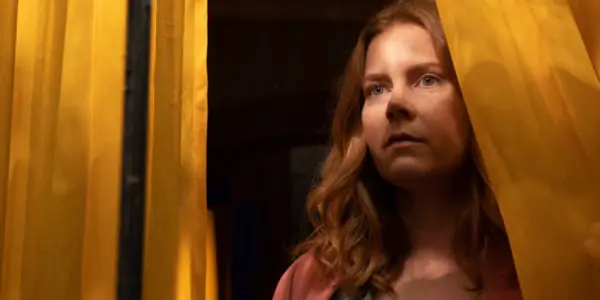Limited set designs to enhance a film have been utilized throughout the history of cinema. The most famous of these films being Alfred Hitchc*ck’s Rear Window. Rear Window is a timeless classic, one future films would attempt to emulate and recapture. And while some have been more successful than others, The Woman in the Window from director Joe Wright, is the latest, delivering a mediocre recreation that, while transformative and entertaining, doesn’t quite hit the mark.
Honoring a Classic
What is immediately apparent in The Woman in the Window is its awareness of its roots. The film immediately pays tribute to Rear Window as the camera spans the bottom floor of Anna’s home, a TV in the corner of the frame showing Jimmy Stewart fighting in the film’s climactic finale. But The Woman in the Window does not stop there, giving viewers a spanning shot sequence of the outside apartments from a stationary window perspective, taking in the various portals to the lives of others, a grainy feel and the brass music of a trumpet player nostalgic to fans of the classic. A Woman in the Window doesn’t hesitate to find moments to include the use of a digital camera for close-up spectatorship.

From here, The Woman in the Window is aware of its need to establish a time frame for the film to work within. The tightened construct further heightens the paranoia and mystery surrounding the film but also gives it a structure to work within, stretching the limits of reality and fiction. With this established, viewers are introduced to Anna (Amy Adams), a child psychologist suffering from Agoraphobia. Unable to leave her home, Anna appears to be making progress, though easily irritated by the inquiring questions of her psychiatrist. As we find, Anna is struggling to move forward from this moment in her life she is stuck in. We do not know why she hasn’t left her house in months, but The Woman in the Window taunts viewers with the constant idea of reality vs fiction.
The Highs and Lows
This is where the film is at its strongest, playing with the narrative and the construct of reality to constantly keep viewers questioning what is really going on. As Anna sleeps, the TV looms over her, almost interacting with her, as though the dream world of fiction has bridged the gap of reality. It is a playful trickery of the camera that finds its success early on in the film. What further heightens this confusion is the film’s sharp, precise and unexpected editing. The execution is firm, characters seemingly snapping out of frame, moving almost too fast for reality. It further blends the confusing line of imagination and paranoia with the question of what is real.
Where The Woman in the Window initially finds strength in its honoring of its roots, the film leans too much into the cliches of the horror genre, becoming more in your face than interwoven, all while losing the originality it had brought to the majority of the film. While the first two-thirds have worked hard to find strength in the inability to decipher reality, it quickly plummets into a generic conclusion that, while having its moments, fails to truly bring the film home. There are a lot of horror references the film draws on beyond Rear Window, the essence of Scream, and classic horror tropes littered throughout. Though, its overuse and in-your-face nature at times remove the heightened intensity, injecting a bit too much predictability in its direction.
Amy Adams Shines
No matter your opinion on this film, no one can deny the dynamic and deeply layered performance delivered by Amy Adams (can we please give her the Oscar already??). She commands your attention, feeding off both the environment she is immersed within and the emotional depth her character deserves. While editing and surrealist design create the confusion, Adams is transformative as Anna, exuding the confidence of a veteran actor while tackling the fragility of her character.
She is supported to by the cast that moves in and around her space. As Adams commands your attention, each performance feeds the paranoia, the reactions of each actor around her facilitating both her story and the narrative. While neither supporting performance outweighs the other, delivering a solid platform for paranoia to swarm, Gary Oldman is reminiscent of the villains he has encompassed in the past while Julianne Moore proves no part is too small for her to shine.
Conclusion: The Woman in the Window
While the ending is a bit rushed and the horror tropes at times overwhelming, The Woman in the Window is still an entertaining venture. In a transformative paranoia and confined space, it may not be the best remake of a classic tale, but it is far from the worst.
Have you seen The Woman in the Window? What did you think? Let us know in the comments below!
The Woman in the Window will stream on Netflix on May 14, 2021.
Watch The Woman in the Windowl
Does content like this matter to you?
Become a Member and support film journalism. Unlock access to all of Film Inquiry`s great articles. Join a community of like-minded readers who are passionate about cinema - get access to our private members Network, give back to independent filmmakers, and more.